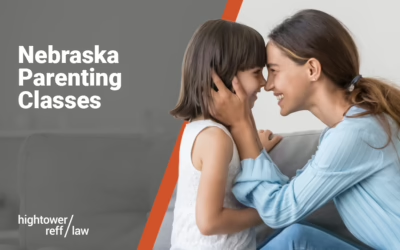 The lawyers at Hightower Reff Law in Omaha, Nebraska, know that going through a child custody case can be tough. Sometimes clients think that “going for sole custody” is the thing to do. It may be because they’re afraid of the prospect of losing the opportunity to spend the time they want with their children and watching them grow up in a meaningful way.
The lawyers at Hightower Reff Law in Omaha, Nebraska, know that going through a child custody case can be tough. Sometimes clients think that “going for sole custody” is the thing to do. It may be because they’re afraid of the prospect of losing the opportunity to spend the time they want with their children and watching them grow up in a meaningful way.
The prospect of losing time – or a full relationship – with either parent can be scary for a child as well. That’s one reason Nebraska courts have switched their views on child custody in recent years.
Not long ago, Nebraska courts almost always gave the mother what most people refer to as “full custody,” unless she was shown to be unfit. In recent years, “full” or sole custody has become the exception rather than the rule.
Joint and Sole Custody Explained
There seem to be some misconceptions about what joint and sole custody mean. One of the most common we hear at Hightower Reff is that sole custody means the parent without custody has no rights or will never see the child again. Neither of those things is true. Here’s what is true of joint and sole custody:
- Joint custody
- Both parents share in all decision making for the child and must agree for a decision to be made.
- Split time with the child (or close to it). The cut off is whether each parent’s parenting time exceeds 142 days a year. Generally, to be considered a “day” the parenting time includes an overnight stay.
- Sole custody
- Only one parent has decision making rights for the child, except in cases of medical emergency when the child is with the non-custodial parent. Then, the non-custodial parent can make medical decisions for the child.
- One parent has the majority of the time with the child. The non-custodial parent typically has parenting time every other weekend, alternating holidays, and one weeknight (that does not include an overnight).
- Both parents still have access to medical and educational records.
A Snowball’s Chance
Just a few years ago, it was relatively rare to see a Nebraska court order joint custody unless the parties agreed and could show the court it was in the child’s best interests. Now, the opposite is true. The chance of getting sole custody may be akin to, well, a snowball’s chance in you-know-where unless there are special circumstances – such as one parent traveling a lot for work, or some other reason one of the parents is unavailable to participate jointly in the raising of the child.
Courts are listening to the experts. Many child welfare and mental health experts say that joint custody is best for children of divorced parents. In most cases, it appears Nebraska courts are giving that opinion of the professional community weight in their decision making.
Meanwhile, opponents of the joint custody trend argue it could be damaging to some children. They say there is evidence that joint custody creates attachment disorders in infants. There’s also discussion by joint custody opponents that, for older kids, switching back and forth between parental homes creates upheaval, stress and inconsistency that could lead to problems.
Room for Argument
While there is a trend toward joint custody, like any area of the law, it isn’t to be treated as a one size fits all thing. Nebraska statutes recognize that the courts must evaluate each situation based on the facts and circumstances of each individual family and make decisions based upon the best interests of the individual child affected by the court’s decision.
Don’t go it Alone
In our many years as family law attorneys, we’ve found at Hightower Reff Law, that it’s best in the long run if parents can reach an agreement regarding their custody arrangements and parenting plan with help from their attorneys or a qualified family law mediator, but sometimes that isn’t possible. If you can’t reach an agreement, it’s important to have an attorney experienced in child custody cases on your side so you have the best chance of proving to the court that your custody proposal – whether joint or sole – is the one that is best for your child.
The earlier in your case you get a good lawyer on board who can help you understand and navigate the Nebraska child custody process, the more peace of mind you will have and the more likely you may be to reach the outcome that is best for you and your children.
This article should not be construed as legal advice. Situations are different and it’s impossible to provide legal advice for every situation without knowing the individual facts.




